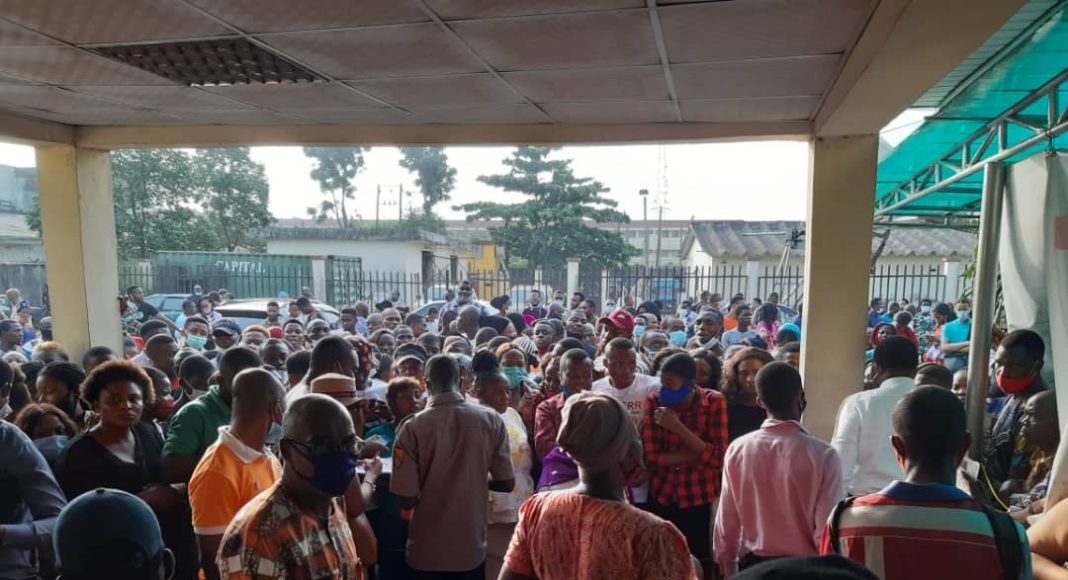By Ope Adetayo
On December 15th, 2020, the Nigerian National Commission issued a directive that all SIM cards must be linked with the owner’s National Identity Number (NIN) before the end of the year, in an attempt to shore up digital security.
The hastily issued directive set off a nationwide scramble to register NIN numbers in large crowds in the middle of a worsening pandemic, and opened an opportunity for government officials to extort millions of Nigerians.
At the time the directive was issued only 42 million out of the 198 million active mobile line users had an NIN, according to a statement from National Identity Management Commission (NIMC), the government agency in charge of managing identity registration. The process to register a number is lengthy and cumbersome, spanning up to four years.
University student Precious Obiorah sought her NIN number on January 2nd, 2021, at a church in Festac, Lagos, that is being used to host overflow from the local government council registration venue.
She attempted to register after the Ministry of Information had extended the initial two-week deadline. It was the first of the multiple times she would go to the location hoping to finally procure her identity number.
The process is supposed to be free of charge but the experiences of millions of Nigerians trying to beat the short deadlines say otherwise.
“Before I went there, the person who referred me to the place already told me I would pay 2000 naira ($5), so I had consciously agreed to pay because they are not even going to register me without doing it,” Obiorah said. “The other place I know, it costs 8000 naira ($20.50) and you come back for registration weeks later.”
When asked about allegations of extortion and the effect of the ongoing mass registration on the country’s fight against coronavirus, NIMC officials did not respond.
Various pictures have surfaced online of overcrowded mass registration venues with complete disregard for the health protocols set by the National Centre for Disease Control. Experts have raised the alarm regarding an unmitigated explosion of coronavirus cases if the NIN registration continues. However, the Ministry of Information has insisted on going ahead with it, betraying a lack of synergy between government agencies.
On February 2nd, NIMC extended the registration until April 6th, but the general panic the process sparked has yet to abate. In the same statement, the commission said that the number of NINs collected by mobile network operators has reached 56.18 million.
While strengthening the country’s security has been cited among others reasons for why the NIN enrollment process must go on regardless of the pandemic, Nigeria’s relationship with data management has been a decades-long story of inefficiency.
Perennially challenged with a lack of digital infrastructure, each successive Nigerian government has found it almost impossible to collect basic data on its estimated 200 million citizens. “The state of Nigeria’s lack of accurate data is such that even the president does not know the country’s populations size,” journalist Yomi Kazeem wrote in 2019.
In order to avoid going to the registration center multiple times like Obiorah, early in January, a freelance printer resident in Lagos who asked to remain anonymous chose to pay the requested 7000 naira ($17.9) to the officials in charge at the local council office at Agege in Lagos. In need to make an urgent bank transaction at that which now mandated the provision of the NIN, he was left with little choice.
“It is not easy with the crowd, I had to use connection,” he admitted. “The people without connection and money find it difficult to do. The whole council had only one laptop and a printer, it was very slow,” he said. After his payment, he was able to get his NIN on the same day.
Tales of corruption have trailed the process nationwide, and the government has not intervened. As thousands queue for their NIN, the extortion goes on unchecked.
“The issue of massive corruption during the registration exercise is avoidable outright if the authorities had put appropriate measures in place before embarking on the policy,” Festus Ogun, a legal analyst and human rights activist, said. “To be mild, the cases of extortion and bribery is a direct indictment on the Nigerian government.”
In a public notice released on Twitter, NIMC reiterated that the enrollment is free and any official caught extorting is liable to “seven years imprisonment.” But no state is enforcing that provision in any part of the country. “This completely shows that the government is not sincere in its fight against corruption,” Festus said.
Obiorah said that the pastor who had arranged for the church to be used as an overflow annex was not surprised by the extortion. “He mentioned that the Nigerian police will tell you that bail is free but when we go there [police station], we still pay and nobody says anything. He said we cannot report because there is even no receipt.”
Four weeks after paying, Obiorah is yet to receive her NIN.

